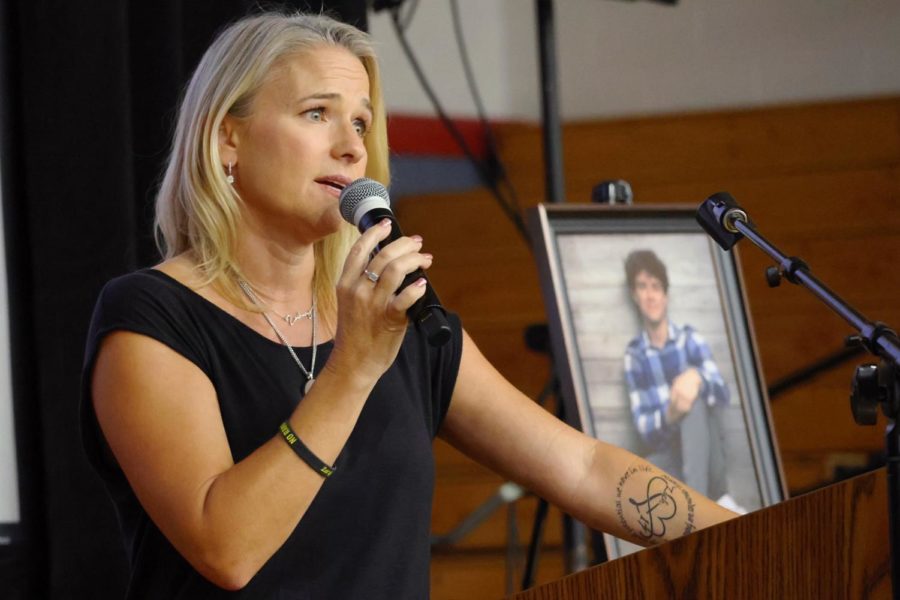On Wednesday, Aug. 31 in Granite Bay High School’s auditorium, students cradle their heads in their arms. Some are crying. All are fixed upon the words of the women in white- the mother of Zach Didier and the mother of Spencer Newsom.
Both Laura Didier and Laura Collanton had had conversations with their sons about drugs, but when fentapills (counterfeit pills that are actually fentanyl) claimed their sons’ lives in 2020, that was the first time Didier and Collanton had ever heard of fentanyl.
The exponential increase in the public’s access to fentanyl has exacerbated the epidemic of fentanyl overdoses and fentanyl poisonings. Experts cite the lucrative profitability, expansive social media platforms that make dealing more accessible and pandemic induced stress as key risk factors.
In an August press release, Placer County District Attorney’s office reported a “450% increase in fentanyl deaths,” from 2019 to 2021. According to District Attorney Morgan Gire, Placer County has had over 20 fentanyl related deaths this year, two a month on average compared to none pre-pandemic.
On Oct. 19, Sacramento officials seized 20,000 fentanyl pills at a Northern California traffic stop.
Newsom, the eldest of Collanton’s children, a certified EMT and aspiring firefighter died on Sept. 21, 2020. Collanton said her son had anxiety and ADHD and had “experimented before, but never thought it was going to take his life.”
Didier’s youngest son, Z. Didier died on Dec. 26. A Whitney High School senior, Z. Didier was a varsity track and field athlete, Eagle scout and a gifted musician and student.
“The main thing with Zach is… he’s very well rounded,” Didier said. “He was just relatable to everybody.”
When Z. Didier died by fentanyl poisoning on Dec. 26, Didier was “dumbfounded,” and “devastated.” Didier said herself and other family members of Z.Didier saw no warning signs.
No parent should see their child dead and cold and taken away by the coroner out of their home. Sometimes I still feel like this is a nightmare that I’m going to wake up from and I’m going to have my normal life back.
— Laura Didier, One Pill Can Kill advocate and the mother of Zach Didier
When Chris Didier, Z. Didier’s father went to check on his son that afternoon, he found him slumped over, his head at the desk, hands at the computer mouse—as Didier describes “cold and gone.”
“No parent should see their child dead and cold and taken away by the coroner out of their home,” Didier said. “Sometimes I still feel like this is a nightmare that I’m going to wake up from and I’m going to have my normal life back.”
Six weeks later, the Didiers received the coroner’s toxicology report with the ruling.
The cause of death?
Fentanyl.
Through the district attorney’s office’s criminal investigation, the Didiers learned their son connected with a dealer that was selling supposedly legitimate pills on Snapchat. Three days earlier, on Dec. 24, Z. Didier and his friend had tried a pill from the same dealer. On the 26th, Z. Didier took another pill, what he thought was the prescription painkiller Percocet and died from fentanyl poisoning.
Didier described the prosecution process and the moment she saw the defendant- 22 year old Snapchat dealer, Virgil Xavier Bordner—as “exhausting and emotional.”
According to Supervising deputy district attorney Lisa Botwinik and One Pill Can Kill speaker, Z. Didier’s case was strong because prosecutors were able to present clear connections through social media exchanges from seller to dealer.
Botwinik said the dealer to buyer connection needed to press second degree murder charges is often more explicit with fentanyl than other drug related deaths, due to its incredible lethality.
Two milligrams of fentanyl, a fraction of a penny’s size, can be lethal.
The legal theory behind the prosecution is not new, Botwinik says, the application is.
“We use the same legal theory and the same laws as we do when a drunk driver hits and kills another person as a result of their drunk driving. It’s the same concept of ‘they know what they’re doing is bad and what they’re doing is dangerous,” Botwinik said. “We want the public to know that when it comes to the prosecution side, dealers could be prosecuted for murder if they continue to sell fentanyl to people who die.”
“It’s murder, second degree murder,” Botwinik said as she addressed the crowd of students, teachers and administrators at GBHS’ Aug. 31 One Pill Can Kill awareness assembly.
In the spring of 2022, the district attorney’s office alongside bereaved parents and other agencies, launched Placer County’s One Pill Can Kill campaign.
“Enforcement and prosecution is only one aspect of dealing with this problem,” Gire said. “We’re not trying to prosecute more, we’re trying to save lives.”
Since its launch, the campaign’s cautionary refrain, “One Pill Can Kill” has spanned across highway 65 digital billboards and student social media campaigns; since Aug. 2022, organizers have frequented Roseville Joint Unified School District high schools for awareness assemblies and hosted informational nights in the Eureka Union School District.
Part of this awareness includes reshaping the stigma around drug related deaths; campaign organizers said using the word overdose instead of poisoning can affect legal and societal perception.
According to Botwinik, the coroner’s and medical examiner’s office alongside the district attorney’s office classifies an overdose as “too much of any substance that kills you.”
“How do you change the minds of people who think it’s your kid’s fault or your fault?” Collanton said. “(They say) if your kid hadn’t bought that drug, they wouldn’t be dead. So it’s their fault. Do you know how horrible that is to hear?” Collanton said.
Didier, who has been featured multiple times in local media coverage, said she’s been subject to victim shaming – evidence of a shift she says is needed in our culture. She began working with A Song for Charlie, a non-profit organization started after a Pasadena couple lost their son Charlie-around eight months before Z. Didier’s death. Her first time publicly sharing started on the theater steps of Whitney High School, where her son once starred as Troy Bolton.
“My heart will always open, it will never be completely healed ever,” Didier said. “It’s tough to talk about it, to relive it, but I really do feel like Zach’s story is powerful and when I do share, I feel like it’s going to impact someone in a positive way,” Didier said. “Maybe we’ll never know exact numbers, there’s no way to measure…how many lives are being saved.”
Inspired by the words of David Kessler, a fellow bereaved parent and prominent expert on loss, Collanton plans to enroll in a grief educator certification program. Collaton has attended a parent loss support group, Grief Care, through Bayside Church and also received individual counseling from a Folsom therapist specializing in child loss.
“Americans are not taught to deal with loss and there is no word in the English language for a parent who’s lost a child,” Collanton said. “The coroner gives you a pamphlet and you are left to negotiate all that comes next.”
Collanton hopes to dually decrease stigma around drug related deaths and provide resources for bereaved parents through starting a non-profit organization.
“I knew I had to fight my own hopelessness and feelings of guilt. I never seriously considered harming myself, but when you’re in that much pain, you just want it to go away,” Collanton said. “And the saddest thing about being a bereaved parent is that you will always be a bereaved parent. My sadness will never subside, just as my kid will never come back.”
Collanton said groups like Drug Induced Homicide who present convicted cases like Didier’s, have been advocating to pass a felony murder or drug-induced homicide statute, like Alexandra’s Law (Senate Bill 350). The bill would require a person who is convicted of selling fentanyl to receive a “written advisory of the danger of manufacturing or distribution of controlled substances.”
Furthermore, the bill states, “if a person dies as a result of that action, the manufacturer or distributor can be charged with voluntary manslaughter or murder.”
“(Drug Induced Homicide) can’t even get it out of the Senate safety committee to change laws around how to and we’re talking about a law… that just gives a warning to dealers…similar to the drunk driving laws,” Collanton said. “But we cannot get it passed in California. There are all these massive barriers.”
Collanton hopes grassroots campaigns like One Pill Can Kill Placer will further needed nationwide conversation among legislators and parents and children.
“The reality is that in the next couple of years, probably every single one of (Placer County youth) are going to know somebody who died (from fentanyl poisoning),” Collanton said. “You kids are the ones that have the ability to stop this epidemic.”
Collanton encourages youth to spread awareness on social media and vote for legislation that will enact drug-induced homicide statutes in California.
Behind the legislation, the prosecution and education efforts of One Pill Can Kill, are the faces of local parents sharing their legacies of loss.
What message would you tell your son if you could?
My message to Spencer would be of unconditional love. I know he’s proud of me and I’m proud of him for all that he accomplished in 20 years. And that even though I wish he had another eighty (years to live)…I am now his voice and his legacy even though he didn’t get to (save lives) as an Emt or paramedic, or firefighter, (he) will still be to save people through me.
— Laura Collanton, One Pill Can Kill Placer advocate and the mother of Spencer Newsom
Their stories are poignant reminders of the campaign’s echoed refrain—one pill can kill now—and the victims are far from strangers.
“My message to Spencer would be of unconditional love,” Collanton said tearfully. “I know he’s proud of me and I’m proud of him for all that he accomplished in 20 years. And that even though I wish he had another eighty (years to live)…I am now his voice and his legacy even though he didn’t get to (save lives) as an Emt or paramedic, or firefighter, (he) will still be to save people through me.”
Collanton’s message to students?
“You have the potential to affect someone else’s life even if you feel yours is at its worst,” she said. “Don’t ever give up and think that your life doesn’t matter because it does. There’s somebody that loves you and your loss would devastate them forever.”
This story was originally published on GraniteBayToday.org on October 28, 2022.





























![IN THE SPOTLIGHT: Junior Zalie Mann performs “I Love to Cry at Weddings,” an ensemble piece from the fall musical Sweet Charity, to prospective students during the Fine Arts Showcase on Wednesday, Nov. 8. The showcase is a compilation of performances and demonstrations from each fine arts strand offered at McCallum. This show is put on so that prospective students can see if they are interested in joining an academy or major.
Sweet Charity originally ran the weekends of Sept. 28 and Oct. 8, but made a comeback for the Fine Arts Showcase.
“[Being at the front in the spotlight] is my favorite part of the whole dance, so I was super happy to be on stage performing and smiling at the audience,” Mann said.
Mann performed in both the musical theatre performance and dance excerpt “Ethereal,” a contemporary piece choreographed by the new dance director Terrance Carson, in the showcase. With also being a dance ambassador, Mann got to talk about what MAC dance is, her experience and answer any questions the aspiring arts majors and their parents may have.
Caption by Maya Tackett.](https://bestofsno.com/wp-content/uploads/2024/02/53321803427_47cd17fe70_o-1-1200x800.jpg)
![SPREADING THE JOY: Sophomore Chim Becker poses with sophomores Cozbi Sims and Lou Davidson while manning a table at the Hispanic Heritage treat day during lunch of Sept 28. Becker is a part of the students of color alliance, who put together the activity to raise money for their club.
“It [the stand] was really fun because McCallum has a lot of latino kids,” Becker said. “And I think it was nice that I could share the stuff that I usually just have at home with people who have never tried it before.”
Becker recognizes the importance of celebrating Hispanic heritage at Mac.
“I think its important to celebrate,” Becker said. “Because our culture is awesome and super cool, and everybody should be able to learn about other cultures of the world.”
Caption by JoJo Barnard.](https://bestofsno.com/wp-content/uploads/2024/01/53221601352_4127a81c41_o-1200x675.jpg)






